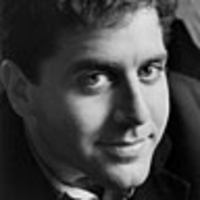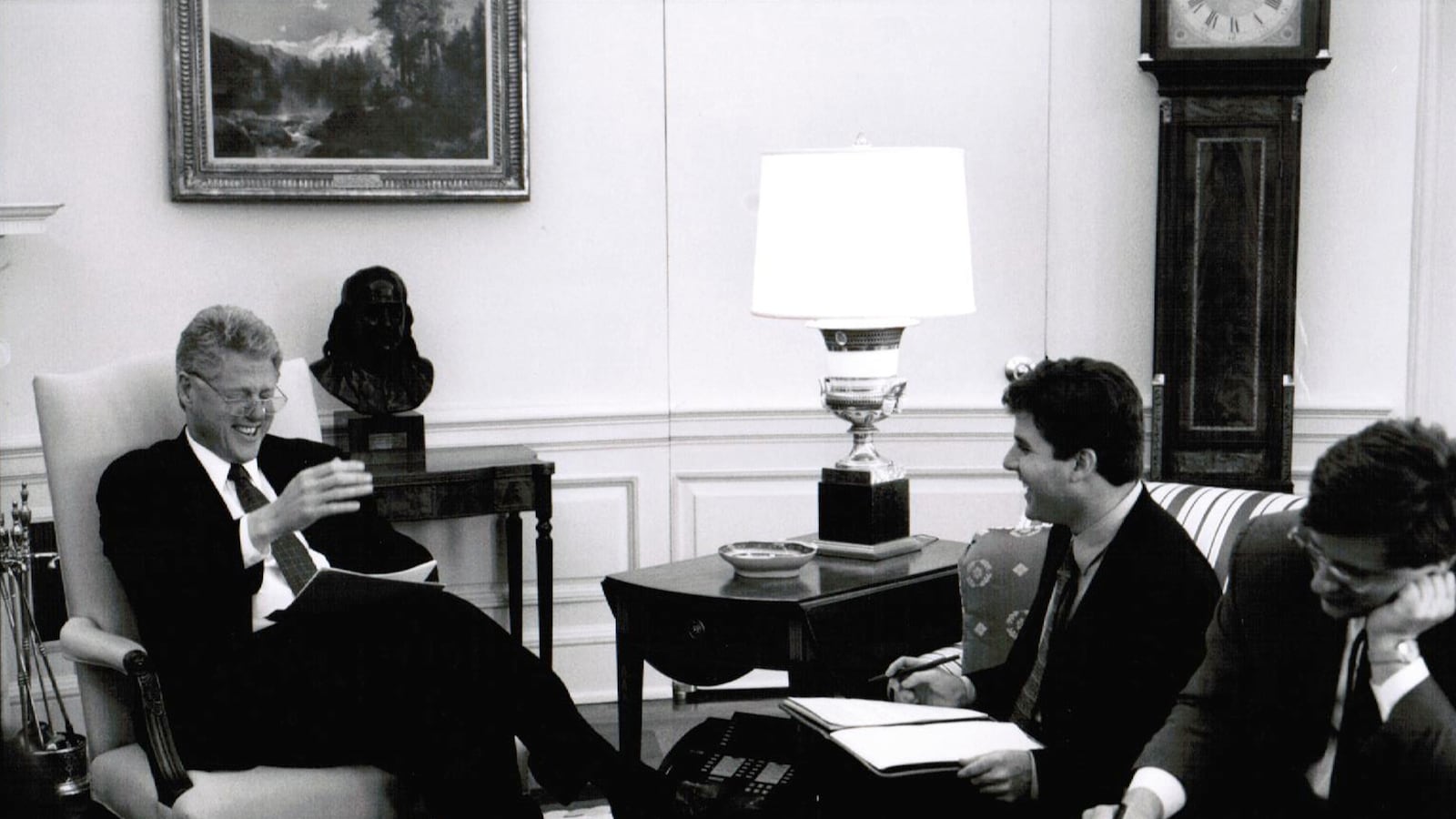Around noon on Friday, April 28, 1995, I was the first to arrive outside the Oval Office. The president’s longtime secretary Betty Currie greeted me with what was in the process of becoming a ritual: “Hey, Funny Man!,” she exclaimed, whereupon I snapped my head around to see if a funny person was indeed standing behind me. A moment later, the president popped his head out of the door to hand something off to her and saw me standing there, a clutch of papers in hand.

“Hey Mark, do you have a funny speech for me there?”
“Yes I do, sir!” I said enthusiastically. Despite the fact that I was the president’s designated humor speechwriter, I wasn’t quick enough to say anything funnier than that.
“Great, we’ll go over it when the rest of the team gets here.”
He went back into his office and closed the door. A few pleasantries with Betty later, Don Baer, the president’s chief speechriter showed up. The pained look on his face suggested I was not going to like what I was about to hear.
“I’ve got bad news for you, Katz. It’s a no-go on the comedy.”
There was a long look as the words set in. As nicely as he knew how, Don was telling me to beat it. We were only ten days removed from a terrorist’s bombing of the Murrah Federal Office Building in Oklahoma City that claimed 168 people (19 children among them) and six days away from the healing benediction Bill Clinton had delivered at the nationally televised memorial service. I had known from the beginning that the humor speech I was working on was contigent upon a game-time decision about whether enough time had passed to give it. The president’s top politcal advisor at the time, Dick Morris, was still watching the president’s approval rating ascend when he determined it would be unwise for Clinton to abruptly change his tone with, of all things, jokes. And so unfolded the most minor tragedy to come of the Oklahoma City bombing: the president would not deliver a funny speech to the 1995 White House Correspondent’s Dinner. (Instead, the comedy portion of the evening would be the responsibility of then-upstart comedian Conan O’Brien.)
I made my way down the narrow halls of the West Wing and through the side door that dumps out in the parking lot across from what was then known as the OEOB. I was lost in self-pity and planning the many calls I would have to make to share the bad news with the fellow comedy writers I had worked with on the speech (most closely with Erik Tarloff). I also had to undo its featured comedy skit: bringing Sesame Street’s Big Bird and the large purple dinosaur Barney to the same stage for the very first time, united by the cause of defending the PBS budget from the ax of Newt Gingrich’s 105th Congress.
When I got back to the desk that I had claimed for the week, the phone was ringing. I rushed to pick it up.
“Is that you, Funny Man? The president wants to see you in the Oval Office right away.”
A sudden burst of energy propelled me back along the very path I had just trudged. Inside of thirty seconds, I was looking right at Betty.
“Go on in, Funny Man!”
I walked into the Oval Office very curious to know what was up. The president was sitting at his desk; Don Baer and Mark Gearan, his communications chief, were standing across.
“Hey Mark,” the president said. “They told me we weren’t going to give your speech tomorrow night but I thought we might just read through it for laughs. You got a minute?”
Did I have a minute? That might have been funnier than anything written on the pages he held in his hand. I sat down in the chair at the side of his desk. The president was about to read me a story, and I was giddy with delight. The only thing that could have added to this delicious moment was if the First Lady had walked through the door right then with a plate of cookies and a glass of milk.
For the next ten minutes, the president delivered the speech for the benefit of an audience of one, with Mark and Don helping to fill the room with laughter. Drawn by the joyful noise, soon enough Betty Currie, West Wing aide Nancy Hernreich and Chief of Staff Leon Panetta were standing at the door and offering theirs as well. Yes, it was his pity for me that brought me to the president’s desk, but I was completely fine with that. What greater pleasure could an emotionally-needy speechwriter know than to be pitied by the most powerful person on earth? The president felt my pain and I was happy to take in every ounce of comfort he set out to give. But as his face flushed red from his full-throated laughter, it was plain to see that this was a guy who–given the grave events of recent days–was probably overdue for a good laugh.
When play-time was over and he walked me to the door, I told President Clinton of the negotiations I had made to bring Barney and Big Bird to the same stage.
“If the Republicans keep it up, maybe we'll try it again next year,” he offered in consolation. “You know what, this may be my best shot at the Nobel Peace Prize!”
“Correct me if I’m wrong, sir,” I said as we got to the door. “I believe it was Henry Kissinger who won the Nobel Prize and President Nixon didn’t.” Taking note that my comic cockiness had been restored to full measure, the president turned to Betty Currie and said, “You know, I think Mark’s feeling better already.” And with that, my extra special trip to the Oval Office was over.
The next night, at the Washington Hilton, President Clinton delivered an alternate draft of a speech he had written himself. Several days earlier, his words at the national prayer service in Oklahoma City had given eloquent voice to the nation's deep sorrow and collective resolve. Two-and-half years into his presidency, he had found his best voice and was about to summon it again on this evening.
“The book of Proverbs says, "A happy heart doeth good like medicine, and a broken spirit drieth the bones." And I believe that. But I think you will all understand that – and I hope my wonderful comedy writers will understand – if I take a few moments tonight not to be too funny here at the end because of the tragedy in Oklahoma City, which has captured us all and which still is the focus of our efforts for understandable reasons tonight, as the rescue workers are still laboring and as the law enforcement officers are still working. “Now, folks, that is the real America. Sometimes all of us forget it a little bit. Sometimes all of us are too bound up in what we are doing. But this country is bound together in a way that the people like those who committed those crimes in Oklahoma can never understand. And I know our government is not perfect, and I know it makes mistakes. But this is a very free country and a very great country. And a lot of the people who are out there complaining about it today would not even be able to do what they do in the way they do it in most of the other democracies in the world today. And we should never forget it. “As this story unfolds, I would ask you to continue to return to Oklahoma City, to update our country on how the families who have suffered so much are rebuilding their lives, and to remind us about the countless heroes we have all seen there. “The terrible people who did this thing do not deserve to be celebrities, although they will become famous. But the victims and their families and the people who have labored, they don't deserve to be forgotten.”
This was a president at the top of his game, giving a speech against a backdrop of challenge and despair that summoned all of his best instincts and extraordinary skills. This was a president who – maybe just that week – had fully grown into the largeness of his office. Before he was done, he even found the generosity of spirit to commend the work of the press corps in the past nine days, no small gesture from such a vocal media critic.
The room could hardly fail to notice that the man at this podium was not the president who, just a few months earlier, had been written off as a likely one-termer by those who write about him. These past months had revived his presidency, and with this sentence I join a long list of observers who make the point that Bill Clinton was well blessed by his adversaries. First there was Newt Gingrich, who allowed himself to be transformed from upstart to foil; now, there were the extreme extremists behind the assault on the American government and its citizens. Of all the hateful, evil and destructive musings that riddled Timothy McVeigh’s brain as he carried out his plot, I doubt he ever anticipated that it would harness the considerable talents of Bill Clinton in a way that allowed him to reclaim his presidency. As he did in Oklahoma City six days earlier, on the night of the White House Correspondents’ Dinner the president made another stirring speech that captured the room.
Seated at a table near the back of the cavernous room, even I – an ardent proponent and practitioner of presidential humor – could see that Bill Clinton had just delivered the exact right speech.





